-
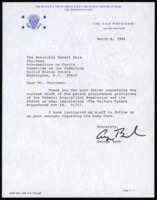 Letter from Vice President George Bush to Senator Bob Dole on The Uniform Patent Procedures Act
Letter from Vice President George Bush to Senator Bob Dole on The Uniform Patent Procedures Act A very short response letter to Bob Dole from Vice President George H.W. Bush. Dole had clearly written to the Vice President previously, regarding how Federal Acquisition Regulation might affect his proposed patent legislation.
-
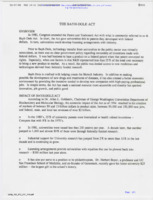 Overview and Impact of the Bayh-Dole Act
Overview and Impact of the Bayh-Dole Act A summary from 1996 looking back at the positive impact the Bayh-Dole Act had on jobs and universities since its implementation in 1980.
-
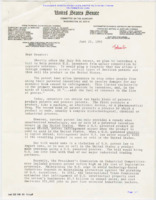 Dear Senator Letter from Committee on the Judiciary Members Regarding Patent Law
Dear Senator Letter from Committee on the Judiciary Members Regarding Patent Law includes a draft of the Process Patent Amendment of 1980
-
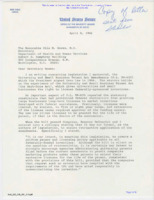 Correspondence Between Bob Dole and Secretary of the Department of Health and Human Services
Correspondence Between Bob Dole and Secretary of the Department of Health and Human Services Includes copy of Dole's original letter sent April 1986 in support of timely processing of requests
-
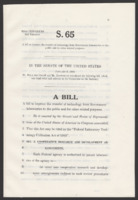 S. 65, Federal Laboratory Technology Utilization Act of 1985
S. 65, Federal Laboratory Technology Utilization Act of 1985
-
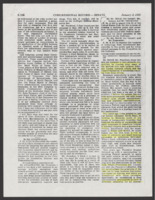 Excerpt from the Congressional Record: Dole Introduces S.64, Uniform Patent Procedures Act, and S.65, Federal Laboratory Technology Utilization Act
Excerpt from the Congressional Record: Dole Introduces S.64, Uniform Patent Procedures Act, and S.65, Federal Laboratory Technology Utilization Act Except from the Congressional Record in which Senator Bob Dole introduces S. 64, a bill to amend title 35 of the United States Code for the purpose of creating a uniform policy and procedure concerning patent rights in inventions developed with federal assistance, and for other purposes. Senator Dole also proposes S.65, a bill to improve the transfer of technology from government laboratories to the public.
-
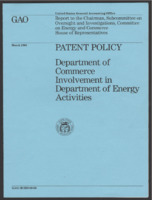 US GAO Report: Patent Policy
US GAO Report: Patent Policy United States General Accounting Office. Report to the Chairman, Subcommittee on Oversight and Investigations, Committee on Energy and Commerce House of Representatives. Patent Policy. Department of Commerce Involvement in Department of Energy Activities.
-
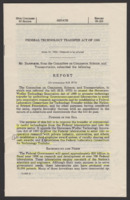 Federal Technology Transfer Act of 1986 Senate Report 99-283
Federal Technology Transfer Act of 1986 Senate Report 99-283 Directly cites the Bayh-Dole Act of 1984. This booklet has highlighted sections and handwritten notes.
-
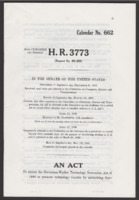 H.R. 3773: An Act to Amend the Stevenson-Wylder Technology Innovation Act of 1980
H.R. 3773: An Act to Amend the Stevenson-Wylder Technology Innovation Act of 1980 Copy of H.R. 3773, An Act to amend the Stevenson-Wylder Technology Innovation Act of 1980 to promote technology transfer by authorizing Government-operated laboratories to enter into cooperative research agreements and by establishing a Federal Laboratory Consortium for Technology Transfer within the National Science Foundation, and for other purposes. This became the Federal Technology Transfer Act of 1986.
-
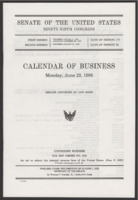 Senate Calendar of Business: Monday, June 23, 1986
Senate Calendar of Business: Monday, June 23, 1986
-
 Memo from Steve Coen to Senator Dole on the Federal Technology Transfer Act of 1986
Memo from Steve Coen to Senator Dole on the Federal Technology Transfer Act of 1986
-
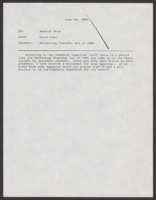 Memo from Steve Coen to Senator Dole on the Federal Technology Transfer Act of 1986
Memo from Steve Coen to Senator Dole on the Federal Technology Transfer Act of 1986 Has a handwritten dash on the upper-righthand corner.
-
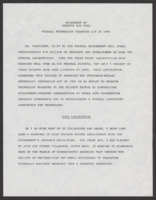 Statement of Senator Bob Dole on the Federal Technology Transfer Act of 1986
Statement of Senator Bob Dole on the Federal Technology Transfer Act of 1986
-
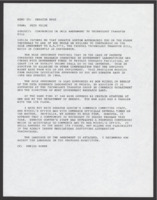 Memo: Compromise on Dole Amendment to Federal Technology Transfer Bill
Memo: Compromise on Dole Amendment to Federal Technology Transfer Bill Memo from legislative assistant Pete Velde to Senator Dole.
-
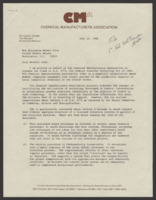 Letter to Senator Dole from the Chemical Manufacturers Association
Letter to Senator Dole from the Chemical Manufacturers Association Letter to Senator Bob Dole from the William M. Stover, Vice President of the Chemical Manufacturers Association expressing reservations on Section 6 of H.R. 3773.
-
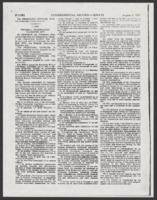 Excerpt from the Congressional Record: Reading of and amendments to H.R. 3773, the Federal Technology Transfer Act, which amends the Stevenson-Wydler Technology Innovation Act of 1980
Excerpt from the Congressional Record: Reading of and amendments to H.R. 3773, the Federal Technology Transfer Act, which amends the Stevenson-Wydler Technology Innovation Act of 1980
-
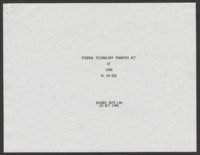 Federal Technology Transfer Act of 1986 PL 99-502
Federal Technology Transfer Act of 1986 PL 99-502 Talking points or report for a presentation. This summarizes and succinctly explains the major points of the Federal Technology Transfer Act of 1986.
-
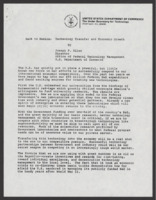 Back to Basics: Technology Transfer and Economic Growth
Back to Basics: Technology Transfer and Economic Growth This press release references Bayh-Dole 1980 legislation.
-
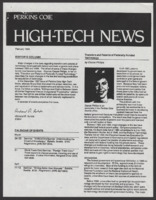 Article: Transfers and Patents of Federally Funded Technology
Article: Transfers and Patents of Federally Funded Technology The article discusses changes in federal patent policy between 1980 and 1986 and how it impacts universities, big and small businesses, and federal laboratories.
-
 Draft of H.R. 3773, to Amend the Stevenson-Wydler Technology Innovation Act of 1980
Draft of H.R. 3773, to Amend the Stevenson-Wydler Technology Innovation Act of 1980 H.R. 3773 became the Federal Technology Transfer Act of 1986.
-
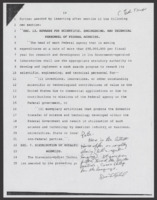 Draft of Technology Transfer Bill, Section 13: Rewards for Scientific, Engineering, and Technical Personnel of Federal Agencies
Draft of Technology Transfer Bill, Section 13: Rewards for Scientific, Engineering, and Technical Personnel of Federal Agencies This copy of part of the technology transfer bill House draft contains a handwritten internal note from a Dole staffer about the House bill being closer to the Senate position.
-
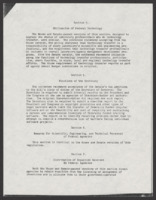 Conference Report: Section 7 of Technology Transfer Bill, Distribution of Royalties Received by Federal Agencies
Conference Report: Section 7 of Technology Transfer Bill, Distribution of Royalties Received by Federal Agencies Report from the congressional Conference on the Federal Technology Transfer bill with the conferees' recommendations on remedying differences between House and Senate bills.
-
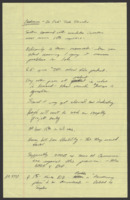 Note: Conference on Federal Technology Transfer
Note: Conference on Federal Technology Transfer Handwritten note on the House version of the Federal Technology Transfer Bill.
-
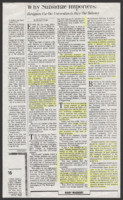 Article: Why Subsidize Importers? Foreigners Use Our Universities to Bury Our Industry
Article: Why Subsidize Importers? Foreigners Use Our Universities to Bury Our Industry Appeared in The Washington Post. Discusses some of the problems that led to the passing of the Bayh-Dole Act.
-
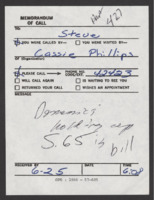 Memorandum of Call from Cassie Phillips regarding S. 65 - Federal Laboratory Technology Utilization Act of 1985
Memorandum of Call from Cassie Phillips regarding S. 65 - Federal Laboratory Technology Utilization Act of 1985 A memorandum of call from Cassie Phillips to Dole legislative assistant Steve Coen regarding S. 65, the Federal Laboratory Technology Utilization Act of 1985. The Federal Laboratory Technology Utilization Act's House companion bill, H.R. 695, was reintroduced as H.R. 3773, the Federal Technology Transfer Act of 1986.
-
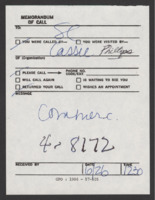 Memorandum of Call from Cassie Phillips for Steve Coen about the Federal Technology Transfer Bill
Memorandum of Call from Cassie Phillips for Steve Coen about the Federal Technology Transfer Bill A memorandum of call from Cassie Phillips to Dole legislative assistant Steve Coen regarding the Federal Technology Transfer bill and a note about what Senator Domenici doesn't like about the bill.
-
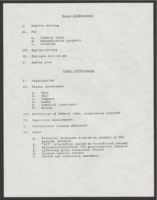 Differences Between House and Senate Version of Technology Transfer Bills
Differences Between House and Senate Version of Technology Transfer Bills List of categories of major and minor differences between the House and Senate version of the Technology Transfer bills. Additionally, contains a handwritten note about the Office of Management and Budget's objections to the bill and the Department of Defense's objections to the bill.
-
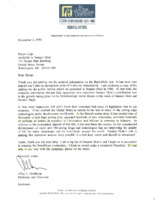 Memo from Bryan Culp to Senator Dole
Memo from Bryan Culp to Senator Dole
-
 Review of the Bayh-Dole Act: Testimony by Senator Dole
Review of the Bayh-Dole Act: Testimony by Senator Dole Review of the Bayh-Dole Act Testimony by Senator Dole to the United States Senate Judiciary Subcommittee on Patents, Copyrights, and Trademarks. Dole discusses the successes of the Bayh-Dole Act, 14 years after it was signed.
-
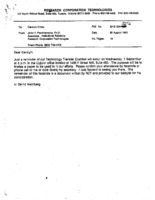 Global Competitiveness and the U.S. Pharmaceutical Industry
Global Competitiveness and the U.S. Pharmaceutical Industry Mentions the Bayh-Dole Act and HR 1443 (Federal Research Commercialization Act).
-
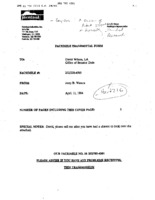 Implementation of the Bayh-Dole Act, 96-517 at the University of Kansas
Implementation of the Bayh-Dole Act, 96-517 at the University of Kansas
-
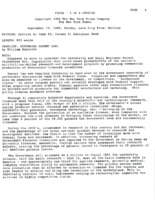 New York Times Articles on the University and Small Business Patent Procedures Act
New York Times Articles on the University and Small Business Patent Procedures Act
-
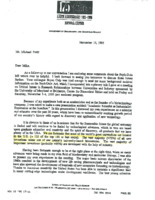 Letter to Michael Pettit from Allan Goldstein on the Bayh-Dole Act
Letter to Michael Pettit from Allan Goldstein on the Bayh-Dole Act Fifteen year retrospective on the Bayh-Dole Act.
-
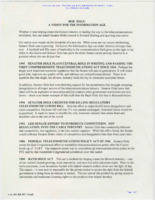 Bob Dole: A Vision for the Information Age
Bob Dole: A Vision for the Information Age List of legislation regarding technology and telecommunication that Senator Dole was involved with, ranging from 1971-1995.
-
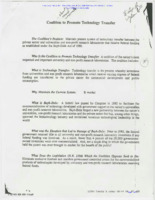 Coalition to Promote Technology Transfer
Coalition to Promote Technology Transfer
-
 AAU Steering Committee on Technology Transfer and Intellectual Property: A Proposal
AAU Steering Committee on Technology Transfer and Intellectual Property: A Proposal Association of American Universities Steering Committee Proposal. Discusses the general research agreement situation between universities and industry and in response to recent government actions, calls for reviews, reports, recommendations going forward.
-
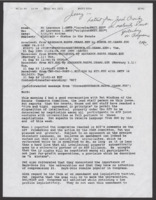 Message from Jack Crowley to Mark Wrighton on University Research and Patents
Message from Jack Crowley to Mark Wrighton on University Research and Patents Bayh-Dole is discussed in this message.
-
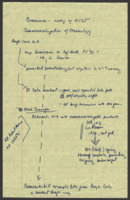 Handwritten Note on Commercialization of Technology
Handwritten Note on Commercialization of Technology A handwritten note in Senator Dole's legislative assistant Mark Scanlan's files listing recent updates and actions related to patent, technology transfer, and research and development policy.
-
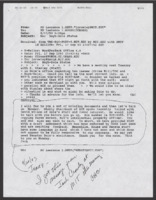 Message from Jack Crowley on Patent Legislation and Universities
Message from Jack Crowley on Patent Legislation and Universities Contains articles on the Bayh-Dole Act and patent legislation relating to Universities.
-
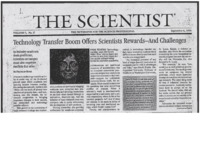 Article: Technology Transfer Boom Offers Scientists Rewards - And Challenges
Article: Technology Transfer Boom Offers Scientists Rewards - And Challenges Top article on the front page of The Scientist: the newspaper for the science professional.
-
 National Patterns of R&D Resources: 1994
National Patterns of R&D Resources: 1994 Table with statistics on the national expenditure for research and development (R&D), by performing sectors and sources of funds for the years 1953-1994.
-
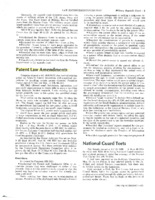 Congressional Quarterly: Patent Law Amendments
Congressional Quarterly: Patent Law Amendments
-
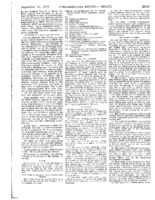 Congressional Record: Senator Birch Bayh Introduces S.4396, Small Business Nonprofit Organization Patent Procedures Act
Congressional Record: Senator Birch Bayh Introduces S.4396, Small Business Nonprofit Organization Patent Procedures Act Senator Birch Bayh's introduction of Senate Bill 3496, the Small Business Nonprofit Organization Patent Procedures Act on the Senate floor. It is a bill to amend title 35 of the United States Senate code to establish a uniform federal patent procedure for small businesses and nonprofit organizations; to create a consistent policy and procedure concerning patentability of inventions made with Federal assistance; and for other related purposes. This bill would later become the University and Small Business Patent Procedures Act, which would become known as the Bayh-Dole Act.
-
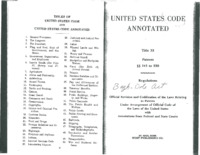 United States Code Annotated: Title 35 Patents
United States Code Annotated: Title 35 Patents Official revision and codification of laws relating to patents under arrangement of official code of the laws of the United States with annotations from Federal and State Courts.
-
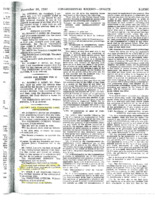 Congressional Record: Senator Bob Dole Presents Amendment to H.R. 6933
Congressional Record: Senator Bob Dole Presents Amendment to H.R. 6933 Senator Bob Dole presents an amendment on the Senate floor to include the University and Small Business Patent Procedures Act in H.R. 6933.
-
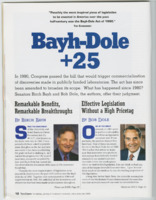 Article: Bayh-Dole +25
Article: Bayh-Dole +25 Twenty-five year retrospective of the Bayh-Dole Act from the perspectives of Birch Bayh and Bob Dole; in the April-May 2005 issue of TechComm.
-
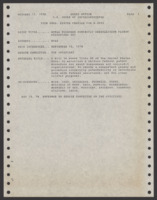 Status Profile for S. 3496, Small Business Nonprofit Organization Patent Procedures Act
Status Profile for S. 3496, Small Business Nonprofit Organization Patent Procedures Act Status from the House Office of the Clerk with the updated actions and current co-sponsors on the Small Business Nonprofit Organization Patent Procedures Act as of October 11, 1978. Clauses proposed in this would later become part of the Bayh-Dole Act.
-
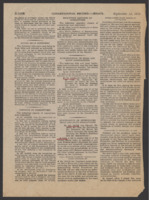 Excerpt from the Congressional Record: Senator Bob Dole Introduces S. 3496
Excerpt from the Congressional Record: Senator Bob Dole Introduces S. 3496 Senator Bob Dole's Introduction of Senate Bill 3496, A bill to amend title 35 of the United States Senate code to establish a uniform Federal patent procedure for small businesses and nonprofit organizations; to create a consistent policy and procdure concerning patentability of inventions made with Federal assistance; and for other related purposes.
-
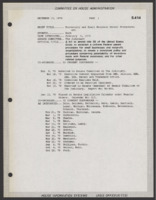 Status Profile for S. 414, University and Small Business Patent Procedures Act
Status Profile for S. 414, University and Small Business Patent Procedures Act Status from the House Office of the Clerk with the updated actions and current co-sponsors on the University and Small Business Patent Procedures Act (which would become the Bayh-Dole Act) as of December 13, 1979.
-
 S. 414, University and Small Business Patent Procedures Act
S. 414, University and Small Business Patent Procedures Act A bill to amend title 35 of the United States Code; to establish a uniform Federal patent procedure for small businesses and nonprofit organizations; to create a consistent policy and procedure concerning patentability of inventions made with Federal assistance; and for other related purposes.
-
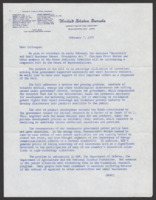 Dear Colleague Letter on the University and Small Business Patent Procedures Act
Dear Colleague Letter on the University and Small Business Patent Procedures Act Letter co-signed by Senators Birch Bayh, Bob Dole, Charles McC. Mathias, Jr., and Dennis DeConcini stating their plan and reasoning to introduce the University and Small Business Patent Procedures Act.
-
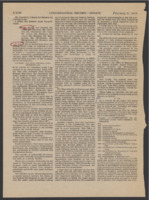 Excerpt from the Congressional Record: Senator Bayh Introduces S. 414 and Senator Dole's Statements
Excerpt from the Congressional Record: Senator Bayh Introduces S. 414 and Senator Dole's Statements
-
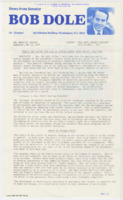 'Public the Victim' for Lack of Limited Patent Right Policy, Dole Says
'Public the Victim' for Lack of Limited Patent Right Policy, Dole Says Press release discusses Senator Dole's and Senator Bayh's proposed University and Small Business Patent Procedures Act, which would become the Bayh-Dole Act.
-
 Dole Announces Legislation to Remedy Problems with Government Patent Policies
Dole Announces Legislation to Remedy Problems with Government Patent Policies Senator Dole announces legislation that will build on the Bayh-Dole Act.
-
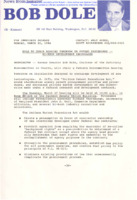 Dole to Chair Hearing Tomorrow on Patent Procedures — Hi-Tech Development Encouraged
Dole to Chair Hearing Tomorrow on Patent Procedures — Hi-Tech Development Encouraged Discusses S. 2171, the Uniform Patent Procedures Act.
-
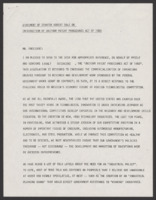 Statement of Senator Robert Dole on Introduction of Uniform Patent Procedures Act of 1983
Statement of Senator Robert Dole on Introduction of Uniform Patent Procedures Act of 1983 This statement references prior Bayh-Dole 1980 legislation
-
 Guest Opinion: Pending Patent and Antitrust Legislation Will Help Strengthen U.S. Competitiveness in Technology
Guest Opinion: Pending Patent and Antitrust Legislation Will Help Strengthen U.S. Competitiveness in Technology Guest opinion written by Senator Bob Dole on two different technology, research & development, and patent bills.
 Letter from Vice President George Bush to Senator Bob Dole on The Uniform Patent Procedures Act A very short response letter to Bob Dole from Vice President George H.W. Bush. Dole had clearly written to the Vice President previously, regarding how Federal Acquisition Regulation might affect his proposed patent legislation.
Letter from Vice President George Bush to Senator Bob Dole on The Uniform Patent Procedures Act A very short response letter to Bob Dole from Vice President George H.W. Bush. Dole had clearly written to the Vice President previously, regarding how Federal Acquisition Regulation might affect his proposed patent legislation. Overview and Impact of the Bayh-Dole Act A summary from 1996 looking back at the positive impact the Bayh-Dole Act had on jobs and universities since its implementation in 1980.
Overview and Impact of the Bayh-Dole Act A summary from 1996 looking back at the positive impact the Bayh-Dole Act had on jobs and universities since its implementation in 1980. Dear Senator Letter from Committee on the Judiciary Members Regarding Patent Law includes a draft of the Process Patent Amendment of 1980
Dear Senator Letter from Committee on the Judiciary Members Regarding Patent Law includes a draft of the Process Patent Amendment of 1980 Correspondence Between Bob Dole and Secretary of the Department of Health and Human Services Includes copy of Dole's original letter sent April 1986 in support of timely processing of requests
Correspondence Between Bob Dole and Secretary of the Department of Health and Human Services Includes copy of Dole's original letter sent April 1986 in support of timely processing of requests S. 65, Federal Laboratory Technology Utilization Act of 1985
S. 65, Federal Laboratory Technology Utilization Act of 1985  Excerpt from the Congressional Record: Dole Introduces S.64, Uniform Patent Procedures Act, and S.65, Federal Laboratory Technology Utilization Act Except from the Congressional Record in which Senator Bob Dole introduces S. 64, a bill to amend title 35 of the United States Code for the purpose of creating a uniform policy and procedure concerning patent rights in inventions developed with federal assistance, and for other purposes. Senator Dole also proposes S.65, a bill to improve the transfer of technology from government laboratories to the public.
Excerpt from the Congressional Record: Dole Introduces S.64, Uniform Patent Procedures Act, and S.65, Federal Laboratory Technology Utilization Act Except from the Congressional Record in which Senator Bob Dole introduces S. 64, a bill to amend title 35 of the United States Code for the purpose of creating a uniform policy and procedure concerning patent rights in inventions developed with federal assistance, and for other purposes. Senator Dole also proposes S.65, a bill to improve the transfer of technology from government laboratories to the public. US GAO Report: Patent Policy United States General Accounting Office. Report to the Chairman, Subcommittee on Oversight and Investigations, Committee on Energy and Commerce House of Representatives. Patent Policy. Department of Commerce Involvement in Department of Energy Activities.
US GAO Report: Patent Policy United States General Accounting Office. Report to the Chairman, Subcommittee on Oversight and Investigations, Committee on Energy and Commerce House of Representatives. Patent Policy. Department of Commerce Involvement in Department of Energy Activities. Federal Technology Transfer Act of 1986 Senate Report 99-283 Directly cites the Bayh-Dole Act of 1984. This booklet has highlighted sections and handwritten notes.
Federal Technology Transfer Act of 1986 Senate Report 99-283 Directly cites the Bayh-Dole Act of 1984. This booklet has highlighted sections and handwritten notes. H.R. 3773: An Act to Amend the Stevenson-Wylder Technology Innovation Act of 1980 Copy of H.R. 3773, An Act to amend the Stevenson-Wylder Technology Innovation Act of 1980 to promote technology transfer by authorizing Government-operated laboratories to enter into cooperative research agreements and by establishing a Federal Laboratory Consortium for Technology Transfer within the National Science Foundation, and for other purposes. This became the Federal Technology Transfer Act of 1986.
H.R. 3773: An Act to Amend the Stevenson-Wylder Technology Innovation Act of 1980 Copy of H.R. 3773, An Act to amend the Stevenson-Wylder Technology Innovation Act of 1980 to promote technology transfer by authorizing Government-operated laboratories to enter into cooperative research agreements and by establishing a Federal Laboratory Consortium for Technology Transfer within the National Science Foundation, and for other purposes. This became the Federal Technology Transfer Act of 1986. Senate Calendar of Business: Monday, June 23, 1986
Senate Calendar of Business: Monday, June 23, 1986  Memo from Steve Coen to Senator Dole on the Federal Technology Transfer Act of 1986
Memo from Steve Coen to Senator Dole on the Federal Technology Transfer Act of 1986  Memo from Steve Coen to Senator Dole on the Federal Technology Transfer Act of 1986 Has a handwritten dash on the upper-righthand corner.
Memo from Steve Coen to Senator Dole on the Federal Technology Transfer Act of 1986 Has a handwritten dash on the upper-righthand corner. Statement of Senator Bob Dole on the Federal Technology Transfer Act of 1986
Statement of Senator Bob Dole on the Federal Technology Transfer Act of 1986  Memo: Compromise on Dole Amendment to Federal Technology Transfer Bill Memo from legislative assistant Pete Velde to Senator Dole.
Memo: Compromise on Dole Amendment to Federal Technology Transfer Bill Memo from legislative assistant Pete Velde to Senator Dole. Letter to Senator Dole from the Chemical Manufacturers Association Letter to Senator Bob Dole from the William M. Stover, Vice President of the Chemical Manufacturers Association expressing reservations on Section 6 of H.R. 3773.
Letter to Senator Dole from the Chemical Manufacturers Association Letter to Senator Bob Dole from the William M. Stover, Vice President of the Chemical Manufacturers Association expressing reservations on Section 6 of H.R. 3773. Excerpt from the Congressional Record: Reading of and amendments to H.R. 3773, the Federal Technology Transfer Act, which amends the Stevenson-Wydler Technology Innovation Act of 1980
Excerpt from the Congressional Record: Reading of and amendments to H.R. 3773, the Federal Technology Transfer Act, which amends the Stevenson-Wydler Technology Innovation Act of 1980  Federal Technology Transfer Act of 1986 PL 99-502 Talking points or report for a presentation. This summarizes and succinctly explains the major points of the Federal Technology Transfer Act of 1986.
Federal Technology Transfer Act of 1986 PL 99-502 Talking points or report for a presentation. This summarizes and succinctly explains the major points of the Federal Technology Transfer Act of 1986. Back to Basics: Technology Transfer and Economic Growth This press release references Bayh-Dole 1980 legislation.
Back to Basics: Technology Transfer and Economic Growth This press release references Bayh-Dole 1980 legislation. Article: Transfers and Patents of Federally Funded Technology The article discusses changes in federal patent policy between 1980 and 1986 and how it impacts universities, big and small businesses, and federal laboratories.
Article: Transfers and Patents of Federally Funded Technology The article discusses changes in federal patent policy between 1980 and 1986 and how it impacts universities, big and small businesses, and federal laboratories. Draft of H.R. 3773, to Amend the Stevenson-Wydler Technology Innovation Act of 1980 H.R. 3773 became the Federal Technology Transfer Act of 1986.
Draft of H.R. 3773, to Amend the Stevenson-Wydler Technology Innovation Act of 1980 H.R. 3773 became the Federal Technology Transfer Act of 1986. Draft of Technology Transfer Bill, Section 13: Rewards for Scientific, Engineering, and Technical Personnel of Federal Agencies This copy of part of the technology transfer bill House draft contains a handwritten internal note from a Dole staffer about the House bill being closer to the Senate position.
Draft of Technology Transfer Bill, Section 13: Rewards for Scientific, Engineering, and Technical Personnel of Federal Agencies This copy of part of the technology transfer bill House draft contains a handwritten internal note from a Dole staffer about the House bill being closer to the Senate position. Conference Report: Section 7 of Technology Transfer Bill, Distribution of Royalties Received by Federal Agencies Report from the congressional Conference on the Federal Technology Transfer bill with the conferees' recommendations on remedying differences between House and Senate bills.
Conference Report: Section 7 of Technology Transfer Bill, Distribution of Royalties Received by Federal Agencies Report from the congressional Conference on the Federal Technology Transfer bill with the conferees' recommendations on remedying differences between House and Senate bills. Note: Conference on Federal Technology Transfer Handwritten note on the House version of the Federal Technology Transfer Bill.
Note: Conference on Federal Technology Transfer Handwritten note on the House version of the Federal Technology Transfer Bill. Article: Why Subsidize Importers? Foreigners Use Our Universities to Bury Our Industry Appeared in The Washington Post. Discusses some of the problems that led to the passing of the Bayh-Dole Act.
Article: Why Subsidize Importers? Foreigners Use Our Universities to Bury Our Industry Appeared in The Washington Post. Discusses some of the problems that led to the passing of the Bayh-Dole Act. Memorandum of Call from Cassie Phillips regarding S. 65 - Federal Laboratory Technology Utilization Act of 1985 A memorandum of call from Cassie Phillips to Dole legislative assistant Steve Coen regarding S. 65, the Federal Laboratory Technology Utilization Act of 1985. The Federal Laboratory Technology Utilization Act's House companion bill, H.R. 695, was reintroduced as H.R. 3773, the Federal Technology Transfer Act of 1986.
Memorandum of Call from Cassie Phillips regarding S. 65 - Federal Laboratory Technology Utilization Act of 1985 A memorandum of call from Cassie Phillips to Dole legislative assistant Steve Coen regarding S. 65, the Federal Laboratory Technology Utilization Act of 1985. The Federal Laboratory Technology Utilization Act's House companion bill, H.R. 695, was reintroduced as H.R. 3773, the Federal Technology Transfer Act of 1986. Memorandum of Call from Cassie Phillips for Steve Coen about the Federal Technology Transfer Bill A memorandum of call from Cassie Phillips to Dole legislative assistant Steve Coen regarding the Federal Technology Transfer bill and a note about what Senator Domenici doesn't like about the bill.
Memorandum of Call from Cassie Phillips for Steve Coen about the Federal Technology Transfer Bill A memorandum of call from Cassie Phillips to Dole legislative assistant Steve Coen regarding the Federal Technology Transfer bill and a note about what Senator Domenici doesn't like about the bill. Differences Between House and Senate Version of Technology Transfer Bills List of categories of major and minor differences between the House and Senate version of the Technology Transfer bills. Additionally, contains a handwritten note about the Office of Management and Budget's objections to the bill and the Department of Defense's objections to the bill.
Differences Between House and Senate Version of Technology Transfer Bills List of categories of major and minor differences between the House and Senate version of the Technology Transfer bills. Additionally, contains a handwritten note about the Office of Management and Budget's objections to the bill and the Department of Defense's objections to the bill. Memo from Bryan Culp to Senator Dole
Memo from Bryan Culp to Senator Dole  Review of the Bayh-Dole Act: Testimony by Senator Dole Review of the Bayh-Dole Act Testimony by Senator Dole to the United States Senate Judiciary Subcommittee on Patents, Copyrights, and Trademarks. Dole discusses the successes of the Bayh-Dole Act, 14 years after it was signed.
Review of the Bayh-Dole Act: Testimony by Senator Dole Review of the Bayh-Dole Act Testimony by Senator Dole to the United States Senate Judiciary Subcommittee on Patents, Copyrights, and Trademarks. Dole discusses the successes of the Bayh-Dole Act, 14 years after it was signed. Global Competitiveness and the U.S. Pharmaceutical Industry Mentions the Bayh-Dole Act and HR 1443 (Federal Research Commercialization Act).
Global Competitiveness and the U.S. Pharmaceutical Industry Mentions the Bayh-Dole Act and HR 1443 (Federal Research Commercialization Act). Implementation of the Bayh-Dole Act, 96-517 at the University of Kansas
Implementation of the Bayh-Dole Act, 96-517 at the University of Kansas  New York Times Articles on the University and Small Business Patent Procedures Act
New York Times Articles on the University and Small Business Patent Procedures Act  Letter to Michael Pettit from Allan Goldstein on the Bayh-Dole Act Fifteen year retrospective on the Bayh-Dole Act.
Letter to Michael Pettit from Allan Goldstein on the Bayh-Dole Act Fifteen year retrospective on the Bayh-Dole Act. Bob Dole: A Vision for the Information Age List of legislation regarding technology and telecommunication that Senator Dole was involved with, ranging from 1971-1995.
Bob Dole: A Vision for the Information Age List of legislation regarding technology and telecommunication that Senator Dole was involved with, ranging from 1971-1995. Coalition to Promote Technology Transfer
Coalition to Promote Technology Transfer  AAU Steering Committee on Technology Transfer and Intellectual Property: A Proposal Association of American Universities Steering Committee Proposal. Discusses the general research agreement situation between universities and industry and in response to recent government actions, calls for reviews, reports, recommendations going forward.
AAU Steering Committee on Technology Transfer and Intellectual Property: A Proposal Association of American Universities Steering Committee Proposal. Discusses the general research agreement situation between universities and industry and in response to recent government actions, calls for reviews, reports, recommendations going forward. Message from Jack Crowley to Mark Wrighton on University Research and Patents Bayh-Dole is discussed in this message.
Message from Jack Crowley to Mark Wrighton on University Research and Patents Bayh-Dole is discussed in this message. Handwritten Note on Commercialization of Technology A handwritten note in Senator Dole's legislative assistant Mark Scanlan's files listing recent updates and actions related to patent, technology transfer, and research and development policy.
Handwritten Note on Commercialization of Technology A handwritten note in Senator Dole's legislative assistant Mark Scanlan's files listing recent updates and actions related to patent, technology transfer, and research and development policy. Message from Jack Crowley on Patent Legislation and Universities Contains articles on the Bayh-Dole Act and patent legislation relating to Universities.
Message from Jack Crowley on Patent Legislation and Universities Contains articles on the Bayh-Dole Act and patent legislation relating to Universities. Article: Technology Transfer Boom Offers Scientists Rewards - And Challenges Top article on the front page of The Scientist: the newspaper for the science professional.
Article: Technology Transfer Boom Offers Scientists Rewards - And Challenges Top article on the front page of The Scientist: the newspaper for the science professional. National Patterns of R&D Resources: 1994 Table with statistics on the national expenditure for research and development (R&D), by performing sectors and sources of funds for the years 1953-1994.
National Patterns of R&D Resources: 1994 Table with statistics on the national expenditure for research and development (R&D), by performing sectors and sources of funds for the years 1953-1994. Congressional Quarterly: Patent Law Amendments
Congressional Quarterly: Patent Law Amendments  Congressional Record: Senator Birch Bayh Introduces S.4396, Small Business Nonprofit Organization Patent Procedures Act Senator Birch Bayh's introduction of Senate Bill 3496, the Small Business Nonprofit Organization Patent Procedures Act on the Senate floor. It is a bill to amend title 35 of the United States Senate code to establish a uniform federal patent procedure for small businesses and nonprofit organizations; to create a consistent policy and procedure concerning patentability of inventions made with Federal assistance; and for other related purposes. This bill would later become the University and Small Business Patent Procedures Act, which would become known as the Bayh-Dole Act.
Congressional Record: Senator Birch Bayh Introduces S.4396, Small Business Nonprofit Organization Patent Procedures Act Senator Birch Bayh's introduction of Senate Bill 3496, the Small Business Nonprofit Organization Patent Procedures Act on the Senate floor. It is a bill to amend title 35 of the United States Senate code to establish a uniform federal patent procedure for small businesses and nonprofit organizations; to create a consistent policy and procedure concerning patentability of inventions made with Federal assistance; and for other related purposes. This bill would later become the University and Small Business Patent Procedures Act, which would become known as the Bayh-Dole Act. United States Code Annotated: Title 35 Patents Official revision and codification of laws relating to patents under arrangement of official code of the laws of the United States with annotations from Federal and State Courts.
United States Code Annotated: Title 35 Patents Official revision and codification of laws relating to patents under arrangement of official code of the laws of the United States with annotations from Federal and State Courts. Congressional Record: Senator Bob Dole Presents Amendment to H.R. 6933 Senator Bob Dole presents an amendment on the Senate floor to include the University and Small Business Patent Procedures Act in H.R. 6933.
Congressional Record: Senator Bob Dole Presents Amendment to H.R. 6933 Senator Bob Dole presents an amendment on the Senate floor to include the University and Small Business Patent Procedures Act in H.R. 6933. Article: Bayh-Dole +25 Twenty-five year retrospective of the Bayh-Dole Act from the perspectives of Birch Bayh and Bob Dole; in the April-May 2005 issue of TechComm.
Article: Bayh-Dole +25 Twenty-five year retrospective of the Bayh-Dole Act from the perspectives of Birch Bayh and Bob Dole; in the April-May 2005 issue of TechComm. Status Profile for S. 3496, Small Business Nonprofit Organization Patent Procedures Act Status from the House Office of the Clerk with the updated actions and current co-sponsors on the Small Business Nonprofit Organization Patent Procedures Act as of October 11, 1978. Clauses proposed in this would later become part of the Bayh-Dole Act.
Status Profile for S. 3496, Small Business Nonprofit Organization Patent Procedures Act Status from the House Office of the Clerk with the updated actions and current co-sponsors on the Small Business Nonprofit Organization Patent Procedures Act as of October 11, 1978. Clauses proposed in this would later become part of the Bayh-Dole Act. Excerpt from the Congressional Record: Senator Bob Dole Introduces S. 3496 Senator Bob Dole's Introduction of Senate Bill 3496, A bill to amend title 35 of the United States Senate code to establish a uniform Federal patent procedure for small businesses and nonprofit organizations; to create a consistent policy and procdure concerning patentability of inventions made with Federal assistance; and for other related purposes.
Excerpt from the Congressional Record: Senator Bob Dole Introduces S. 3496 Senator Bob Dole's Introduction of Senate Bill 3496, A bill to amend title 35 of the United States Senate code to establish a uniform Federal patent procedure for small businesses and nonprofit organizations; to create a consistent policy and procdure concerning patentability of inventions made with Federal assistance; and for other related purposes. Status Profile for S. 414, University and Small Business Patent Procedures Act Status from the House Office of the Clerk with the updated actions and current co-sponsors on the University and Small Business Patent Procedures Act (which would become the Bayh-Dole Act) as of December 13, 1979.
Status Profile for S. 414, University and Small Business Patent Procedures Act Status from the House Office of the Clerk with the updated actions and current co-sponsors on the University and Small Business Patent Procedures Act (which would become the Bayh-Dole Act) as of December 13, 1979. S. 414, University and Small Business Patent Procedures Act A bill to amend title 35 of the United States Code; to establish a uniform Federal patent procedure for small businesses and nonprofit organizations; to create a consistent policy and procedure concerning patentability of inventions made with Federal assistance; and for other related purposes.
S. 414, University and Small Business Patent Procedures Act A bill to amend title 35 of the United States Code; to establish a uniform Federal patent procedure for small businesses and nonprofit organizations; to create a consistent policy and procedure concerning patentability of inventions made with Federal assistance; and for other related purposes. Dear Colleague Letter on the University and Small Business Patent Procedures Act Letter co-signed by Senators Birch Bayh, Bob Dole, Charles McC. Mathias, Jr., and Dennis DeConcini stating their plan and reasoning to introduce the University and Small Business Patent Procedures Act.
Dear Colleague Letter on the University and Small Business Patent Procedures Act Letter co-signed by Senators Birch Bayh, Bob Dole, Charles McC. Mathias, Jr., and Dennis DeConcini stating their plan and reasoning to introduce the University and Small Business Patent Procedures Act. Excerpt from the Congressional Record: Senator Bayh Introduces S. 414 and Senator Dole's Statements
Excerpt from the Congressional Record: Senator Bayh Introduces S. 414 and Senator Dole's Statements  'Public the Victim' for Lack of Limited Patent Right Policy, Dole Says Press release discusses Senator Dole's and Senator Bayh's proposed University and Small Business Patent Procedures Act, which would become the Bayh-Dole Act.
'Public the Victim' for Lack of Limited Patent Right Policy, Dole Says Press release discusses Senator Dole's and Senator Bayh's proposed University and Small Business Patent Procedures Act, which would become the Bayh-Dole Act. Dole Announces Legislation to Remedy Problems with Government Patent Policies Senator Dole announces legislation that will build on the Bayh-Dole Act.
Dole Announces Legislation to Remedy Problems with Government Patent Policies Senator Dole announces legislation that will build on the Bayh-Dole Act. Dole to Chair Hearing Tomorrow on Patent Procedures — Hi-Tech Development Encouraged Discusses S. 2171, the Uniform Patent Procedures Act.
Dole to Chair Hearing Tomorrow on Patent Procedures — Hi-Tech Development Encouraged Discusses S. 2171, the Uniform Patent Procedures Act. Statement of Senator Robert Dole on Introduction of Uniform Patent Procedures Act of 1983 This statement references prior Bayh-Dole 1980 legislation
Statement of Senator Robert Dole on Introduction of Uniform Patent Procedures Act of 1983 This statement references prior Bayh-Dole 1980 legislation Guest Opinion: Pending Patent and Antitrust Legislation Will Help Strengthen U.S. Competitiveness in Technology Guest opinion written by Senator Bob Dole on two different technology, research & development, and patent bills.
Guest Opinion: Pending Patent and Antitrust Legislation Will Help Strengthen U.S. Competitiveness in Technology Guest opinion written by Senator Bob Dole on two different technology, research & development, and patent bills.
